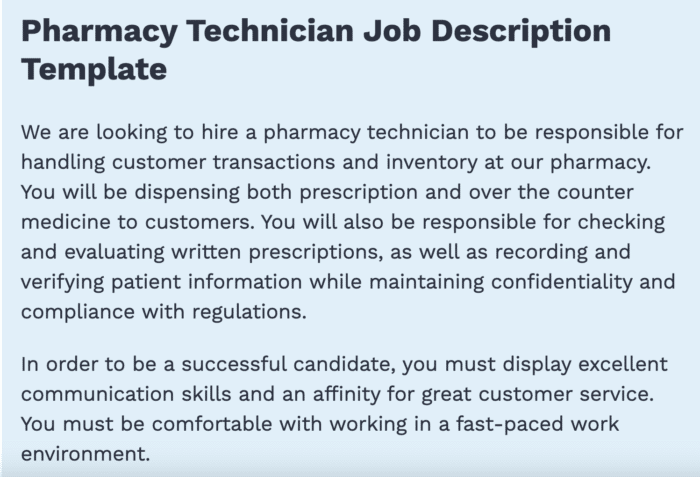Have you been wanting to apply for pharmacy technician jobs?
Been wondering what the job description for pharmacy technicians looks like?
Let us help you with that.
A job description typically entails the roles and responsibilities required for the role posted, the educational requirements needed for the role, and the incentives offered by the company, such as the salary and other perks.
In this article, we will discuss a Pharmacy Technician’s Job Description and what is typically needed.
Let’s begin.
Pharmacy Technician Job Description Template
Responsibilities
Pharmacy Technicians are important members of the healthcare team. They help in dispensing the patients with the right medicines. They work with pharmacists and other healthcare professionals in places like hospitals, clinics, community pharmacies, government pharmacies, etc.
Pharmacy Technicians generally also have other tasks apart from medication dispensing, doing calculations, and making sure medicines used to treat different ailments are sterile.
They also collect important patient information and help with billing claims. Sometimes, they also interact with patients to know their medication history.
Read More: What Does a Pharmacy Technician Do
Top Reasons to Become a Pharmacy Tech
Now that you know what a typical job description looks like for Pharmacy technicians, you must be wondering if it is worth it to pursue as a career.
We are here to help you decide.
Let us look at the top reasons to become a pharmacy technician. There are many different job options for people who want to work as a pharmacy technician, whether they want to work full-time or part-time.
If you have completed formal training or have worked in this field before, there are even more opportunities available to you.
Read more:
Pharmacy Technician Training
Pharmacy Technician Programs
The scope of the health services industry holds a major percentage, providing over 11 million jobs, including those who work for themselves or we can say those who are self-employed.
Out of the 20 jobs that are predicted to grow the fastest, 10 of them are in the health services sector. So, there will be more and more jobs in healthcare compared to other types of jobs from 2018 to 2028.
You don’t need to go to college for a long time to get most of these jobs. Many of them require less than four years of college education.
Right now, there is a high demand for pharmacy technicians, and it’s expected to keep growing. The reason behind this is, that as pharmacies offer more services to patients, they will need more pharmacy technicians to help out.
Pharmacy technician jobs are expected to increase rapidly because, with the rise of the baby boomer population, more and more people are using medications to treat their health problems.
Pharmacy technicians can move on to perform different tasks as they evolve in their jobs. They might become supervisors, focus on specific areas like effectively preparing medicines or using computer systems, or they can study more to become pharmacists.
Technicians can learn special skills like preparing sterile medicines, using pharmacy machines, managing finances, and administration of vaccines.
A survey conducted by ASHP found that 56 percent of pharmacy places give opportunities for technicians to grow in their careers. In another survey, 81 percent of technicians said they plan to keep working as technicians for five years or more.
So, becoming a pharmacy technician just might be worth it.
Additional Sources:
Pharmacy Technician Salary
Pharmacy Technician FAQ
Day in the Life of a Pharmacy Technician
How to Become a Certified Pharmacy Technician
How to Get Pharmacy Technician Certificate
How To Get Pharmacy Technician License
Related Articles
-
How to Be Successful in College in 2022 – 7 Simple Tips to Succeed
-
How Do Scholarships Work? Read This First…Truth is Shocking
-
7 Best College Majors 2024: What Should I Major In?
-
How to Choose a College – 10 Things You Must Consider in 2024
-
Why Go to College? Top 13 Benefits for Adult Students in 2022
-
Top 5 Best Alternatives to Community College for 2024









